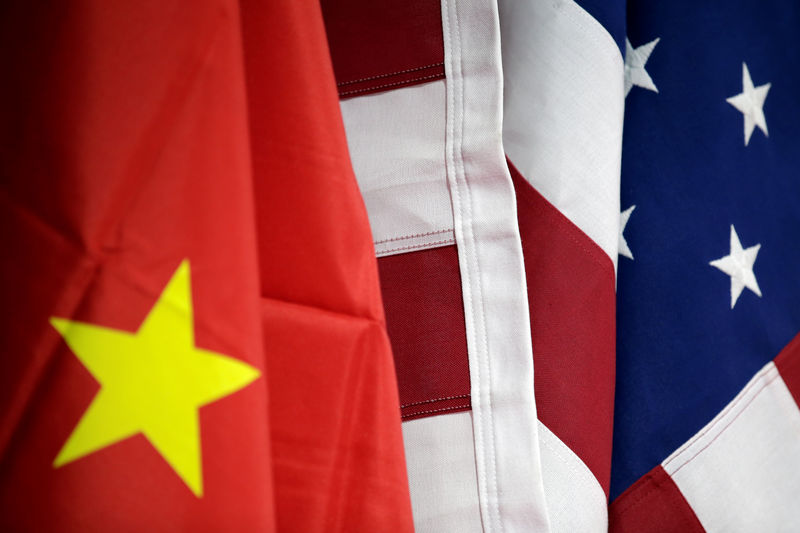By Michael Martina and Andrea Shalal
BEIJING/WASHINGTON (Reuters) - U.S. and Chinese officials will restart trade talks at the end of this week, but any agreement the world's largest economies carve out is expected to be a superficial fix.
The trade war has hardened into a political and ideological battle that runs far deeper than tariffs, trade experts, executives, and officials in both countries say.
China's Communist Party is unlikely to budge on U.S. demands to fundamentally change the way it runs the economy, while the U.S. won't backtrack on labeling Chinese companies national security threats.
The conflict between the two countries could take a decade to resolve, White House economic advisor Larry Kudlow warned on Sept. 6. Yu Yongding, an influential former policy adviser to China's central bank, told Reuters that China was in no rush to make a deal.
Presidents Donald Trump and Xi Jinping may hammer out an interim agreement in October to soothe stock markets and claim political victory after this week's lower-level talks.
But any final agreement is "extremely unlikely to meaningfully address the Chinese structural reforms" sought by the U.S. and other countries, said Kellie Meiman Hock, a former U.S. Trade Representative official and managing partner with McLarty Associates, a policy and government consultancy.
Negotiators have made little discernable progress on the many points of disagreement since negotiations broke down in May, sources briefed on the talks say.
ISSUES DIVIDE
Beijing is unwilling to address the way it supports state-owned companies and subsidizes their products in coming talks, sources in China and the U.S. say. The U.S. continues to label Chinese tech company Huawei a national security threat, and dangle the threat of new tariffs against China.
"The ultimate result of talks must be the dropping of all tariffs," said He Weiwen, senior fellow, Chongyang Institute for Financial Studies at Renmin University. "This is the baseline for China." He is not optimistic about the talks' prospects.
Since trade negotiations between the world's largest economies collapsed in May, both countries have also broken promises and traded public insults. The mood is upbeat, but a single Trump tweet could turn that around, analysts say.
"They're locked in this uncomfortable embrace," said William Reinsch, a former senior Commerce Department official and Center for Strategic and International Studies fellow.
"Both presidents have undercut their negotiators and neither side can rely on what the other has said," he said.
'TECTONIC SHIFT'
Trump's "tough on China" stance has swept in a new way of thinking about Beijing in Washington, despite the unpopularity of many of his other policies. The U.S. Congress, bitterly divided along partisan lines on most issues, is united about the need for systemic reform in China.
Democrats running against Trump aren't likely to repair the China relationship if they take the White House in 2020. In a debate on Sept. 12, presidential candidates used terms like corruption and theft to discuss China's trade practices.
"There's been a tectonic shift," said Warren Maruyama, former general counsel for the U.S. Trade Representative's office and a partner with law firm Hogan Lovells.
"The old idea that China was in the middle of free market economic reforms that would lead them our way is effectively dead," Maruyama said. "There's bipartisan support for a tougher China policy."
Lawmakers are responding, with several China-related bills making their way through Congress, from legislation to punish Beijing for human rights abuses against Muslims in Xinjiang and to support protesters in Hong Kong.
Additionally, the 2020 National Defense Authorization Act, or NDAA, could include provisions targeting China on issues ranging from technology transfers to the sale of synthetic opioids.
POLITICAL PRESSURE
Trump faces a worsening economy and recession fears at home, thanks in part to the tariffs he has enacted, but key constituencies have stood by him so far. U.S. executives in China say Beijing is miscalculating if it thinks the trade war will undermine Trump's political support.
"If anything, the trade war has unified support in the business community," one senior American executive in China said.
"The problems are deep, and they are structural," said Craig Allen, a former senior U.S. Commerce Department official who now heads the US-China Business Council. The countries' high-tech sectors may be permanently decoupled, he said, thanks to concerns about Chinese espionage, cyber hacking and intellectual property theft.
China's Communist Party also faces a slowing economy as it prepares to celebrate on Oct. 1 70 years of ruling the country.
Many in Beijing believe that Trump's erratic approach to the trade war this year has provided Xi with convenient short-term political cover, allowing him to blame White House tariff increases instead of domestic policies for the slowdown.
In a throwback to the Mao Zedong era, Xi told cadres this month that there must be a "resolute struggle" against any risks and challenges to the party's leadership, the country's sovereignty and security and anything that threatens the country's core interests.
Investments between China and the U.S. dropped to the lowest six-month level in five years in the first half of this year, a study by the research firm Rhodium Group shows.
Foreign direct investment and venture-capital deals between the two countries fell to $13 billion in the period, down 49% from the first half of 2018.
